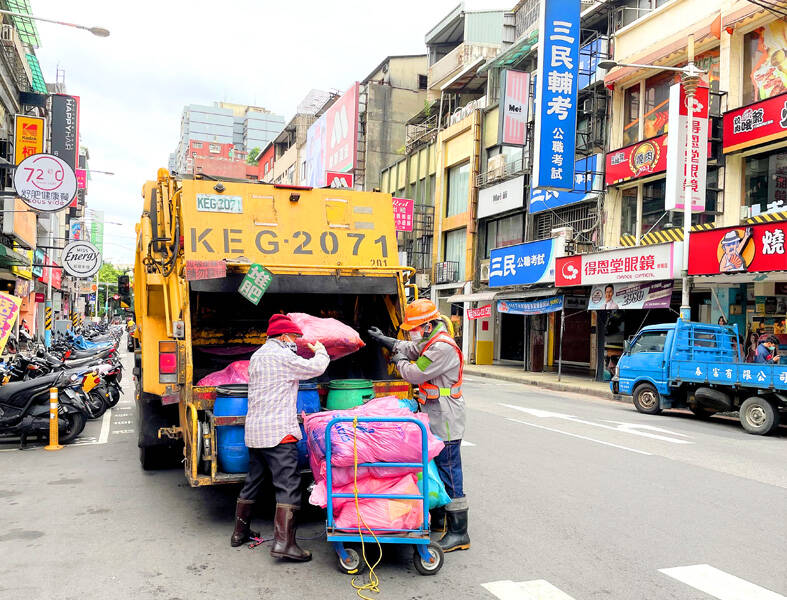The great cleaning effort before the Lunar New Year symbolizes the removal of items that have outlived their usefulness.
Numerologist Yang Teng-ke (楊登嵙) on Wednesday provided a list of a number of household goods that one should remove to prevent bad luck or adverse health.
Broken dishes, cups and containers were on Yang’s list.

Photo courtesy of the New Taipei City Environmental Protection Bureau
Aside from the danger such items pose, the missing edge of an item symbolizes a “leak” that could lead to loss of wealth, he said.
Dead plants should be uprooted and removed, whether in a garden or indoors. Lifeless foliage left to linger could lead to sickness or the decline of luck for all those living in the residence, Yang said.
Yang also suggested removing expired drugs and food, not just for the ill health ingesting them could cause, but their presence could also bring delays to good fortune throughout the year.
Damaged or malfunctioning appliances should either be repaired or discarded, he said.
An aggregation of unrepaired devices can diminish a person’s “energy field” and cause fortune to wane, he said.
Aging dolls or figurines attract bacteria and germs, and are also considered nexuses of “negative energy” that could cause people who keep such items to experience ailing health or run into paranormal occurrences, Yang said.
Worn out or tattered clothing should also be discarded, as these items represent decay and rot, and negatively affect a person’s fortune or bring ill health, Yang said.
Old magazines, if improperly stored, can be a source of mold, which can affect one’s health, he added.
Finally, items that conjure bad memories or negative emotions should be discarded, he said.
Yang said that prolonged negative emotions can make a person suffer mentally and physically, leading to a decline in well-being and overall good fortune.

WANG RELEASED: A police investigation showed that an organized crime group allegedly taught their clients how to pretend to be sick during medical exams Actor Darren Wang (王大陸) and 11 others were released on bail yesterday, after being questioned for allegedly dodging compulsory military service or forging documents to help others avoid serving. Wang, 33, was catapulted into stardom for his role in the coming-of-age film Our Times (我的少女時代). Lately, he has been focusing on developing his entertainment career in China. The New Taipei District Prosecutors’ Office last month began investigating an organized crime group that is allegedly helping men dodge compulsory military service using falsified documents. Police in New Taipei City Yonghe Precinct at the end of last month arrested the main suspect,

A cat named Mikan (蜜柑) has brought in revenue of more than NT$10 million (US$305,390) for the Kaohsiung MRT last year. Mikan, born on April 4, 2020, was a stray cat before being adopted by personnel of Kaohsiung MRT’s Ciaotou Sugar Refinery Station. Mikan was named after a Japanese term for mandarin orange due to his color and because he looks like an orange when curled up. He was named “station master” of Ciaotou Sugar Refinery Station in September 2020, and has since become famous. With Kaohsiung MRT’s branding, along with the release of a set of cultural and creative products, station master Mikan

Eleven people, including actor Darren Wang (王大陸), were taken into custody today for questioning regarding the evasion of compulsory military service and document forgery, the New Taipei District Prosecutors’ Office said. Eight of the people, including Wang, are suspected of evading military service, while three are suspected of forging medical documents to assist them, the report said. They are all being questioned by police and would later be transferred to the prosecutors’ office for further investigation. Three men surnamed Lee (李), Chang (張) and Lin (林) are suspected of improperly assisting conscripts in changing their military classification from “stand-by

LITTORAL REGIMENTS: The US Marine Corps is transitioning to an ‘island hopping’ strategy to counterattack Beijing’s area denial strategy The US Marine Corps (USMC) has introduced new anti-drone systems to bolster air defense in the Pacific island chain amid growing Chinese military influence in the region, The Telegraph reported on Sunday. The new Marine Air Defense Integrated System (MADIS) Mk 1 is being developed to counter “the growing menace of unmanned aerial systems,” it cited the Marine Corps as saying. China has constructed a powerful defense mechanism in the Pacific Ocean west of the first island chain by deploying weapons such as rockets, submarines and anti-ship missiles — which is part of its anti-access/area denial (A2/AD) strategy against adversaries — the